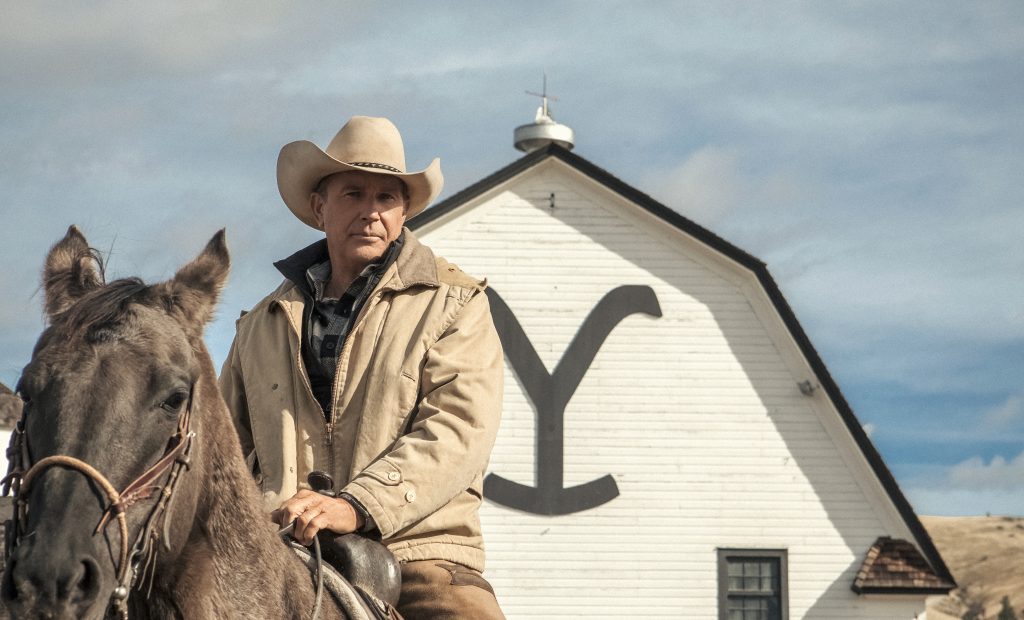Yellowstone – Season 1
“It’s not fair, this life.”
We started off the season with a man soothing his horse before putting it out of its misery. After the crack of his gun, we opened to the destruction around him.
This scene hinted what’s to come. The violence and death happens quietly, behind the scenes (but not to the audience), yet the ramifications play out loud. Progress came by way of a semi and crashed—literally—into John Dutton’s zealously protected world.
“I’m skipping straight to ‘or else’.”
Taylor Sheridan’s Yellowstone was progress horning into the traditions and old world life many of us hold onto with both hands.
We have the ranch life of Montana. We have Jenkins, who rolled into town with his bulldozers, three-piece suits and golfing against the green backdrop of Utah Montana. In the middle, we have Rainwater, returning as the prodigal son and trying to bash through Jenkins and Dutton to regain a birthright he’s inherited.
“They’re building a city.”
At the start, Yellowstone presented us with these three worldviews trying to succeed by thumbing their noses at the law.
Ironically, Jenkins survived the way he did by working the law. Sort of. He skirted the boundaries with property taxes and buyouts.
Rainwater played the law with the tribal police, declaring some issues were tribal concerns and used that as the blanket excuse to cover up, charge in and twist rules to breach the Dutton ranch defenses.
John Dutton just killed people. Well, people did it for him. And by the way, he is kind of the law; he’s Montana’s Livestock Commissioner.
So three bad guys, right? Well, not exactly.
“If you do nothing, you will be judged for that, too.”
Yellowstone’s early episodes waffled between the three men and their machinations. Granted, Jenkins was presented sleazier than the rest. Yet the audience was invited to pick a side. Jenkins claimed right by progress. Rainwater claimed he was right by a reclaimed heritage. John Dutton claimed right protecting a ranch his family owned for a hundred and thirty-two years.
The problem was the characters felt like they were only presenting their side of the story to us. Who do we sympathize with more? The characters lacked conviction for me at this point; they were playing their parts—very well, mind you—but their motivations felt cliché. The early part of the season was inconsistent for me.
“We don’t share land here.”
In the later episodes, however, the show made it more about the Duttons struggling with attacks from both sides: Rainwater and Jenkins. From this point, Yellowstone found its footing. When the show itself chose a side, the storylines became focused, the characters were more determined in their goals.
Once Yellowstone identified it’s the Duttons versus the world, it was easier to buy into the characters’ motivations. Their conflicts felt more tangible: a ranch run for generations versus a world who deemed it antiquated and wrong. John Dutton was no longer a thug with a helicopter, rough cowboys and a lot of cows. He’s a father, trying to ward back the waves of progress, burdened with no reliable heir to continue Yellowstone‘s survival.
“Which disappointment is this?”
Towards the last half of the season, the show drew a figurative line in the sand. Not only did the show made us choose a side (the Duttons), but the characters did as well. Beth was no longer the broken daughter determined to create a scene—actually, she still is—she’s weaponized by her father to go against Jenkins. Casey had been flitting between not being his father’s son and his father’s son. Finally, in the end, well before Jenkins’s confession hanging (pun intended) over him, Casey accepted the role he must play and became the potential heir apparent of Yellowstone.
“Nice job, Jamie.”
And Jamie? Throughout the season, he was in denial he was his father’s lackey, just the fix-it guy for the Duttons. He told himself he was doing this for family, but as the fight for Yellowstone reaches its peak, Jamie finally picked a side: himself. Or at least, he thinks that’s what he did.
“Progress doesn’t need your permission.”
At first glance, Yellowstone appeared to be a western paying homage to the gritty, sun-drenched ballad of the roughened cowboys. But at second glance, I realized Yellowstone went beyond that.
It’s the testimony of resistance: to progress, history and self. It is denying or accepting where you’re from. It’s the loss of a neighborhood coffeehouse to yet another Starbucks but in a macro scale. Progress will always come; whether you welcome it or not. How far you’ll fight it or embrace it is translated into the cinematic beauty of Yellowstone.
Watch or skip?
I might be reading too much into Yellowstone. I could be just content at the sweeping visuals of wildness and the often idealized manly depictions of a cowboy’s life. However, Yellowstone struck a chord in me, especially in the latter half of the season.
Is Yellowstone worth watching? I say yes. Season two is looking to be potentially intensified. Jenkins may be gone, but he warned there would be more like him storming in to take Yellowstone. Rainwater lost a partner, but I doubt he’ll back off. Yellowstone can only remain in a bubble for so long. Now with Casey and Beth helping to defend Yellowstone, you can expect the fight to be battled out on the fields: literally and politically.
Not quite a Western…
Yellowstone was an enjoyable drama that was actually not far from the reality we’re familiar with. We’ve seen and witnessed struggles with progress on a personal scale. To see it on screen, no matter what the setting, gave us something to relate to; whether you’re a fan of Westerns or not. Yellowstone can be happening in some form anywhere right now.
But probably with less bloodshed. And fewer cows.
Stay connected with So Many Shows:
Get More:
Podcast: Disenchantment Eps 1 – 3

